The fall of the frontons: What happened to jai alai?
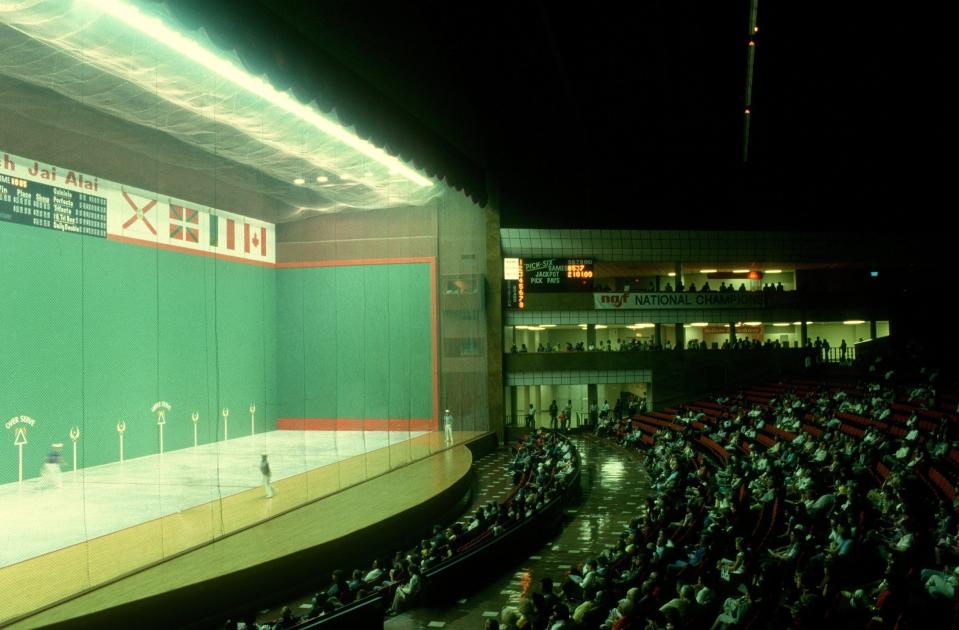
This story originally ran in The Palm Beach Post on May 31, 2009
It's a Friday night at Miami Jai Alai and the place is dead. Only 46 seats are taken — 47 if you include the center-court spot occupied by a garbage can cordoned off by yellow police tape. Evidently, the chair is in the same state of disrepair as its surroundings.
The upside, if it can be called that, is that those 46 souls surpassed by seven the crowd at a Dania Jai Alai matinee three days prior.
Few people care about jai alai anymore. Many under 30 haven't even heard of it.
Those are easy conclusions to draw by anyone who wants to sweep jai alai into a pile with horse racing and boxing as sports that belong in a museum or a memory.
But look closer at that heap and you'll see not just a few dozen men with strange wicker baskets attached to their hands. You'll see slivers of Miami itself, and Fort Lauderdale, and West Palm Beach.
You'll see Florida.
"No visit to Miami is complete without seeing at least one game of jai alai," says the ad, whose yellowing signifies that bygone era. Hype, that was not, because long before a garbage can sat in that courtside seat, the game personified a slice of life in South Florida.
If you sat in that seat, it meant you bought it for the entire season, then wedged your way through the masses for the right to use it.
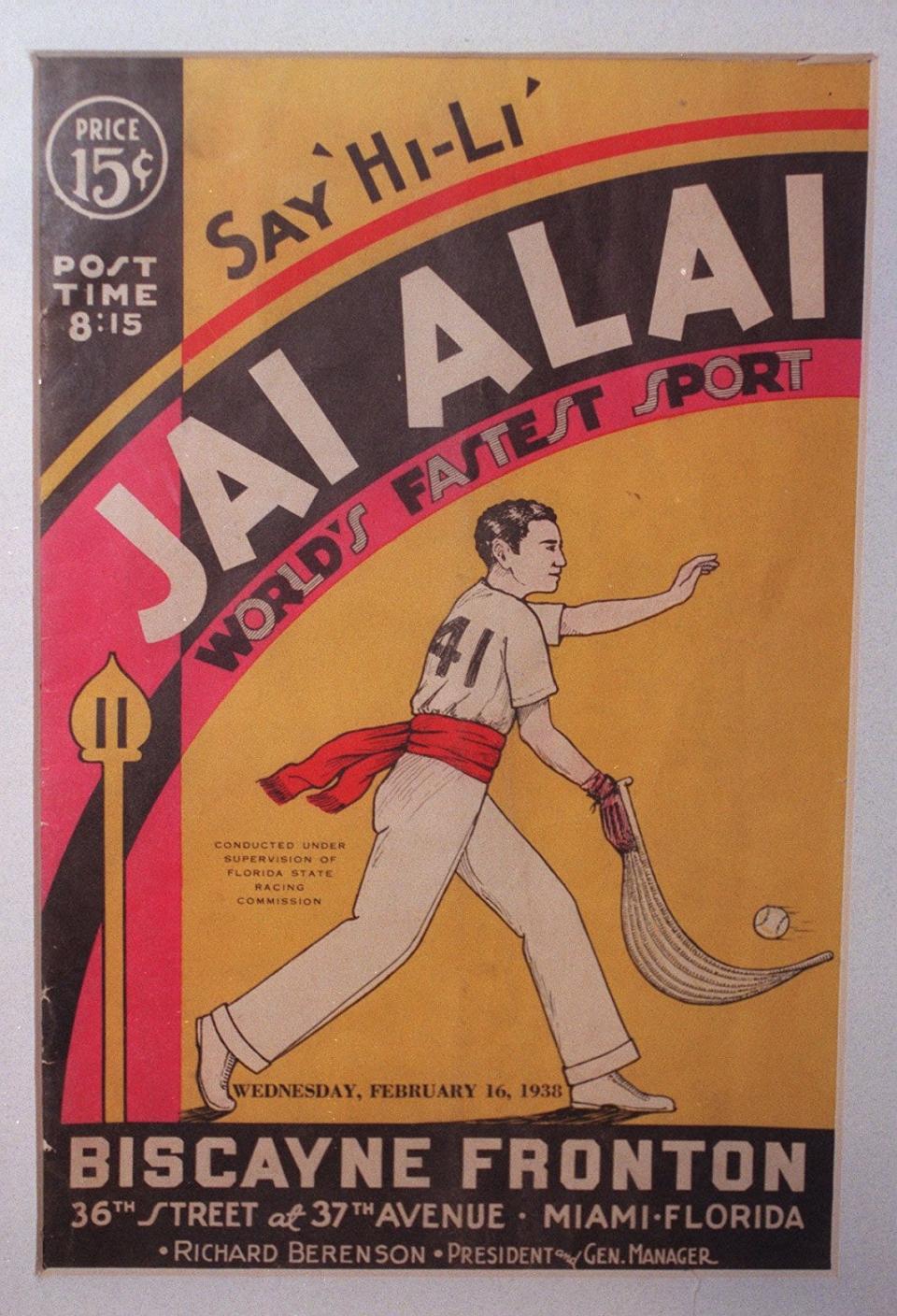
"Say 'hi-li'" is how the ads back then read, and South Floridians said it, all right. Jai alai came along four decades before the Miami Dolphins, and it took years for the Fins' attendance to surpass Miami Jai Alai's annual gate. (A newcomer named Don Shula was humbled there one evening when informed that fans actually were shouting "Chula!" to hail outstanding shots.)
"It was like New Year's Eve," says Stan Schauer, 84, a 30-year diehard who comes to Dania to wager every Tuesday afternoon with a dozen fellow residents of Boynton Beach's Valencia Lakes. "Everybody came here."
Bob Hope did. So did Hubert Humphrey and Babe Ruth and Jackie Gleason. Rocky I (Marciano) and Rocky II (Sylvester Stallone). Ernest Hemingway visited, and wrote about, the fronton in Havana.
The romance is long gone
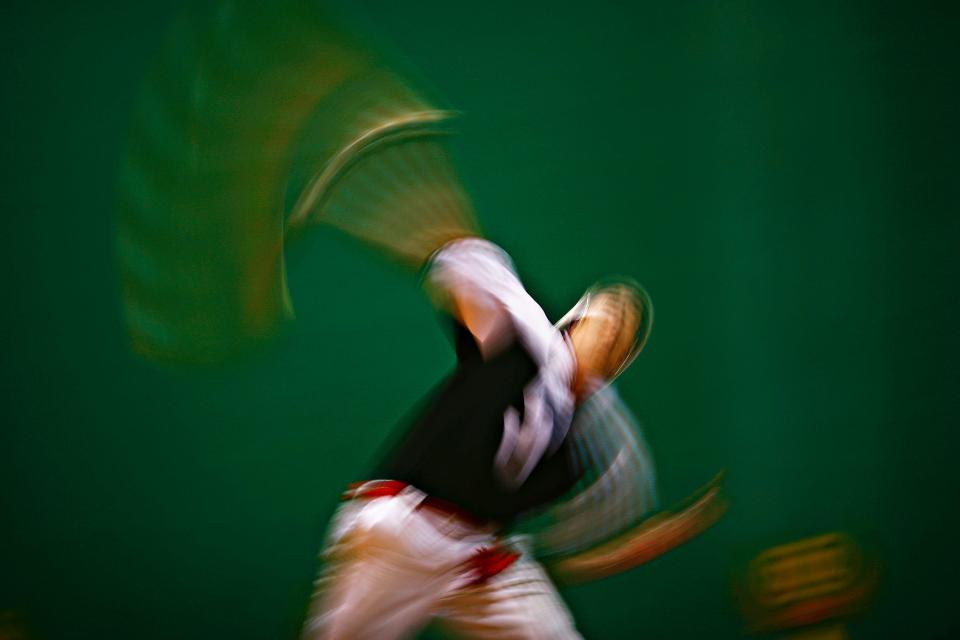
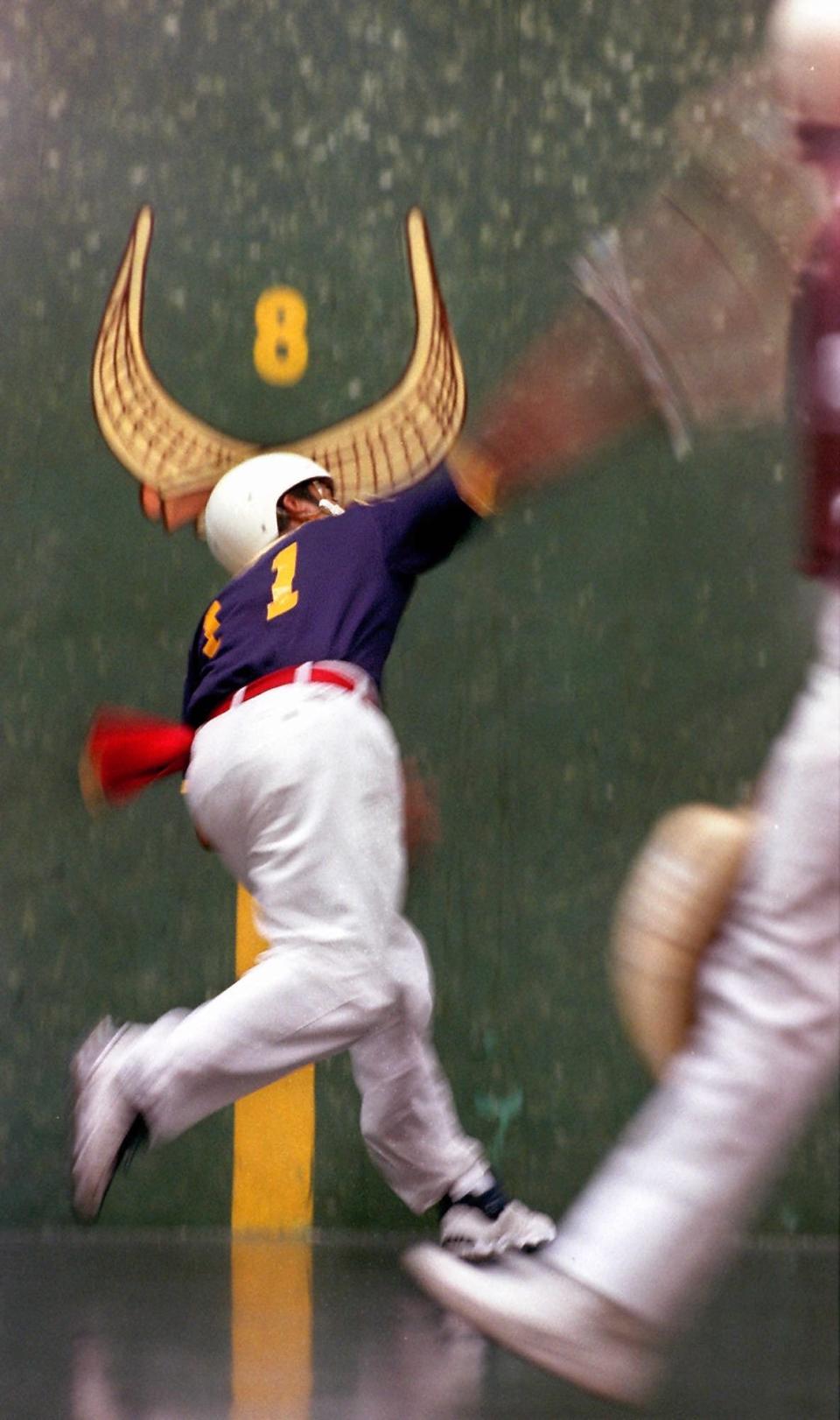
There was something romantic about this centuries-old Spanish sport that resembles a distant cousin of racquetball played on a three-walled court some 175 feet long and 50 feet wide. Something quaint about betting on these spider men who scaled the protective screen and the walls in relentless pursuit of a pelota soaring fast enough to shatter bulletproof glass.
In the original days, when the Miami fronton was known as Biscayne Jai Alai, gentlemen wore suits; women, flowing dresses. Between games, an orchestra satisfied those who wanted to rumba.
Miami seated about 6,500, but old-timers tell of Saturday nights when there were thousands more standing 10 deep along the outer aisles. If you called on a Monday for a seat on a Saturday, maybe you'd get one. Maybe.
"Now, somebody asks you, you can give them the whole section if they want — 'What do you want, Section A, B, C?'" one veteran says.
The speaker? Joey Cornblit, but to longtime South Floridians, "Joey" suffices. He's now 53, living in Plantation and a grandfather, but for 25 years, Joey was one of the top jai alai players in the world, if not numero uno.
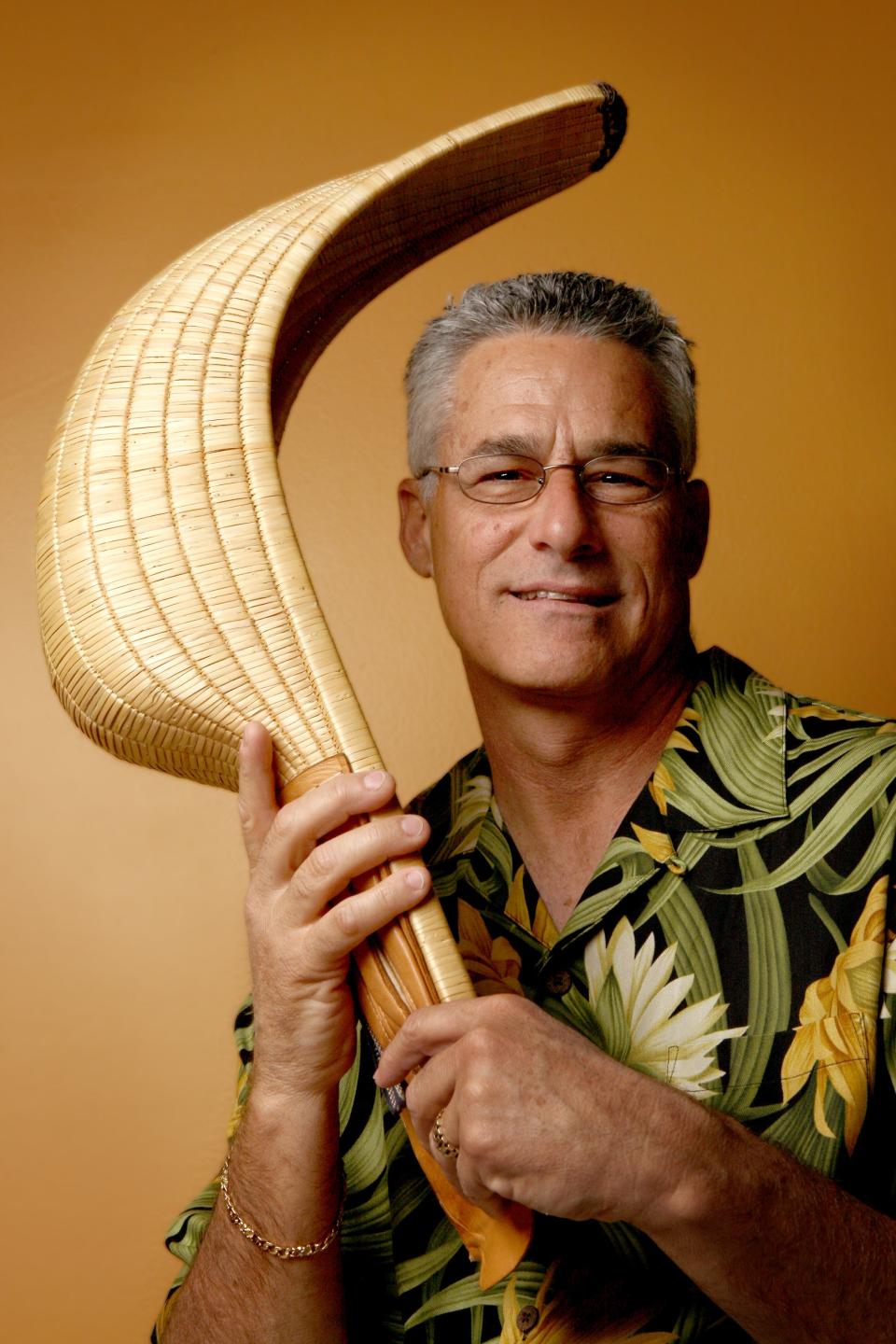
Joey was a brash high school kid from Miami whose parents had to sign his first professional contract because he was only 16. The "nice Jewish boy" quickly transcended the game: When Miami's Larry King went national with his radio show, his first guests were Gleason, Shula and Joey.
Eventually, Joey figured, he'd become a jai alai analyst on TV. Except there is no jai alai on TV.
There's barely jai alai.
"It's on life-support," Joey says. "It just saddens me to see."
There used to be 14 frontons in the United States. Today, only two in the country offer performances year-round — Dania and Miami. Only four others remain, all in Florida, including Fort Pierce, but they offer jai alai about two months a year largely to maintain licenses for poker rooms. Inter-track wagering is another lifeline for frontons.
Palm Beach Jai Alai closed in 1994 and shares the fronton graveyard with those from Connecticut, Rhode Island and Nevada. In 2005, a small facility outside Gainesville became the first pro fronton to open in the United States in 27 years.
No longer the place to be seen
What happened to jai alai? A series of body blows neither Rocky could have absorbed: Player strikes. The introduction of Indian casinos. The lottery. An influx of pro teams. Cable and satellite TV. A novelty that aged. The fall has been nastier than any jai alai player's thud on the floor. For the 2007-08 fiscal year, $68.7 million was bet on the sport in Florida, compared with $430.3 million wagered 20 years before.

"It was part of the fabric," says Benny Bueno, 45, a veteran player at Fort Pierce Jai Alai.
Bueno had a speaking part in a jai alai-themed episode of Miami Vice, which featured the sport as prominently as bikinis in its weekly opening credits. Today, many diehards hope slot machines or more card games can be saviors, although those hopes have been voiced for years.
"People think dinosaurs are extinct, or jai alai is extinct," Bueno says. "It's not. It's coming back."
Can it?
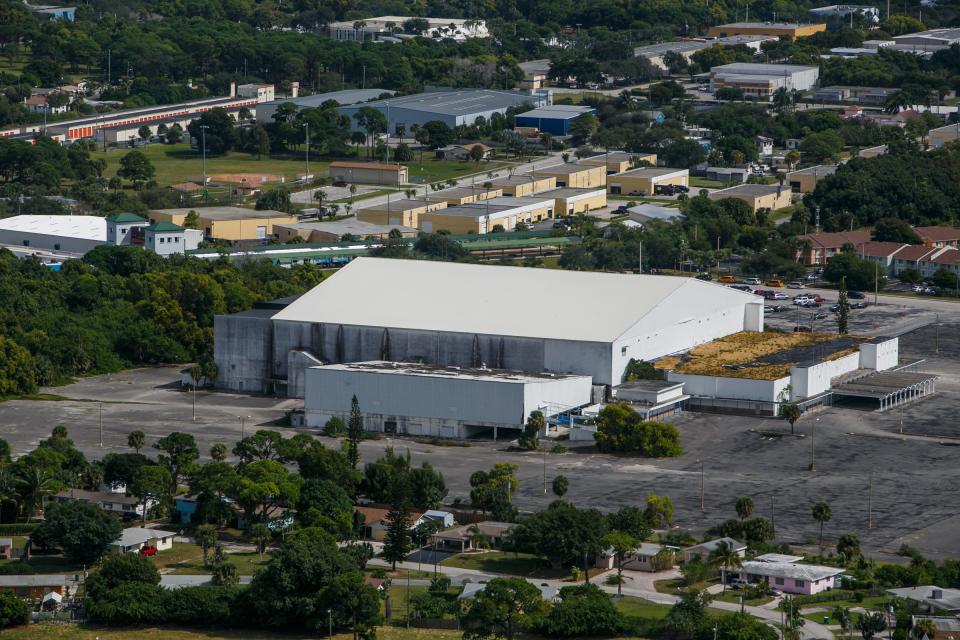
"To where it was?" says Daniel Michelena, Miami Jai Alai's director of player personnel and a standout player from 1983-2001. "I'm not sure it will."
Boyd Gaming, Dania's parent company, says several factors including the economy have caused it to drop renovation plans, including slots. Miami's executives did not respond to requests for details on their plans or the state of the facility.
"Miami Jai Alai, Dania Jai Alai, used to be the place to be seen at," Joey says. "It was first class. The best jai alai in the world was played there. There was nothing more electric in town than coming on a Saturday night when you had 10,000, 12,000 people screaming, the ball hitting the front wall with a cracking sound you could hear walking in the front door ..."
Now, Palm Beach Jai Alai on 45th Street is abandoned. Boxing promoter Don King and wife Henrietta bought the building for $6.25 million in 1999 and planned to pour millions into renovations for a "state of the art" entertainment complex.
Now, Don says, it's for sale.
Since the court is intact, could jai alai return? Doubtful. King bought it from the Palm Beach Kennel Club, which in an effort to avoid competition did not include the pari-mutuel license in the deal.
"What a turnaround it would be if the self-proclaimed greatest promoter would turn around and bring it back," Bueno says.
King: "I haven't contemplated that."
Trying to dodge death
If the walls of South Florida's frontons could talk, they might out-yap even King. In 1978, the original Palm Beach Jai Alai was destroyed by an arsonist who might have had ties to organized crime. In 1981, Roger Wheeler, owner of Miami Jai Alai's parent firm, World Jai Alai, was killed by a mob enforcer.
In 1987, someone won $97,345 at Fort Pierce and gave it to his church. In '97, a Dania employee was rescued after trying to hang himself from the balcony during play. In 2004, a robber made off with $7,000 from the Washington Mutual across the street from Dania and figured he'd play poker until the heat wore off. Deputies nabbed him, the loot and his chips. Now, frontons are so quiet that when Dania spectators point out a scoreboard error, players stop and look up.
"It's not easy" to play before such sparse crowds, says Aminol Lopez, who in jai alai tradition is known by just one name, Lopez, and is Miami's leader in wins. "You have to focus on the game and not think there is nobody there."
Lopez, a Spaniard, is only 25. His generation never experienced the electricity Joey recalls.
"We've heard stories about it," Lopez says. "But now, reality is different."
The annual handle at Dania and Miami is about $18 million each, roughly half of what it was two decades ago. "I don't want to say it's a dying sport," says Pembroke Pines' Kenny Krinsky, a Dania regular. "But I think it is."
The restaurants inside Dania and Miami are closed. The only modern areas are the card rooms.
"I'm surprised that building is still up," Joey says of Miami. "The building is dilapidated. They really need to level it and build another building, but that's not going to happen."
Joey's accomplishments are well-represented in the lobby, where a room is filled with the sport's memorabilia. The glory days stretch so far back that one ad is from the Cuban National Tourist Commission, touting Pan Am's Miami-to-Havana flights for jai alai fans. Another ad, referring to the rare fatal injury suffered in the sport, takes on an entirely different meaning today.
"The Game of Dodging Death," it says.
Is jai alai itself dodging death? Maybe an omen sits in the dark perimeter of the fronton, where a TV is on even though its picture tube is blown, leaving only a thin, horizontal line through the middle of the screen.
Sadly, it looks like a flat line.
This article originally appeared on Palm Beach Post: Is there still jai alai in the U.S.? Dania and Miami operate all year.

